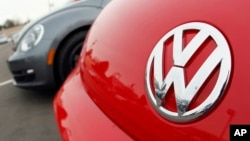The Volkswagen pollution scandal got worse Tuesday when the German company said it had tampered with emission controls on millions more diesel vehicles than it first admitted.
U.S. regulators said Friday that Volkswagen had equipped about 500,000 cars with software that switched pollution controls on during tests, but shut them off during normal driving. Volkwagen admitted Tuesday that some 11 million of the German carmaker's diesel vehicles actually contained the software.
The cars spewed 40 percent more emissions into the air without the controls. Cars that drive without pollution controls generally perform better. Volkswagen advertised the affected models as being better for the environment.
U.N. officials said Volkswagen's admission was "extremely troubling" and urged the carmaker to correct the situation. German Chancellor Angela Merkel called the VW issue "difficult" and urged the company to explain its actions thoroughly. Britain and France have called for a Europe-wide investigation, and Italy has requested information on the issue.
South Korea announced it also would investigate the Volkswagen scandal, summoning VW representatives to Seoul to discuss the matter, and the U.S. Justice Department has also said it plans a criminal investigation.
Volkswagen CEO Martin Winterkorn apologized for cheating on the emissions tests. The German company is allocating $7.3 billion to cover the cost of recalls and other efforts to mitigate the damage.
Along with having to pay to fix the rigged cars, Volkswagen could face as much as $18 billion in fines.
The deficient models include the VW Jetta, Beetle and Golf from 2009 through 2015, the Passat from 2014 to 2015, and the Audi A3 from 2009 to 2015. Owners of "clean diesel" vehicles have filed a class-action lawsuit against Volkswagen.
Shares in Volkswagen dropped close to 20 percent Tuesday, after suffering a significant loss Monday.
Some information for this report was provided by AFP and Reuters.





